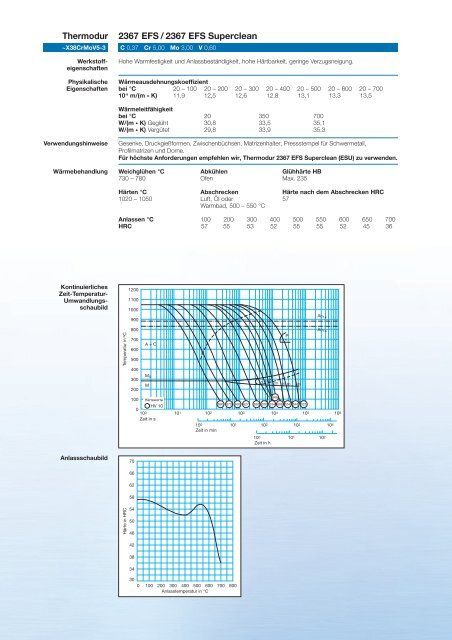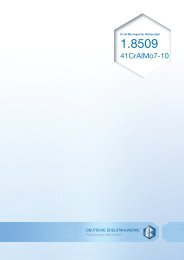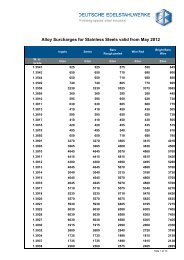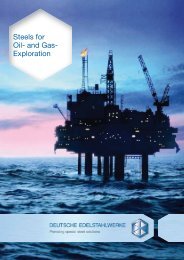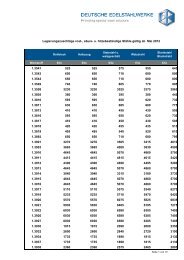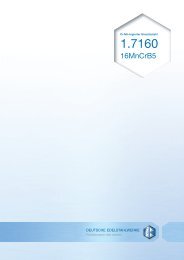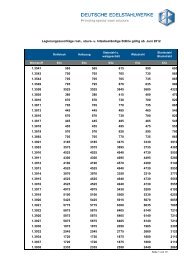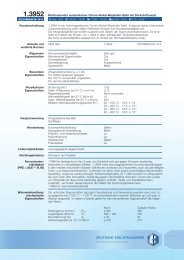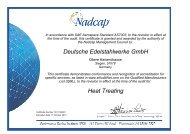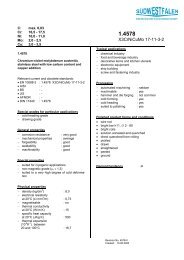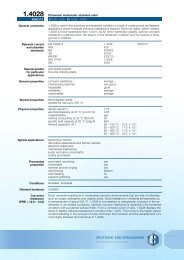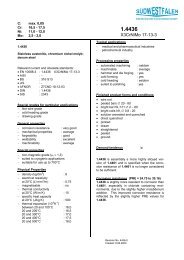Thermodur 2367 EFS / 2367 EFS Superclean - DEW-STAHL.COM
Thermodur 2367 EFS / 2367 EFS Superclean - DEW-STAHL.COM
Thermodur 2367 EFS / 2367 EFS Superclean - DEW-STAHL.COM
Sie wollen auch ein ePaper? Erhöhen Sie die Reichweite Ihrer Titel.
YUMPU macht aus Druck-PDFs automatisch weboptimierte ePaper, die Google liebt.
<strong>Thermodur</strong><br />
~X38CrMoV5-3<br />
Werkstoffeigenschaften<br />
Physikalische<br />
Eigenschaften<br />
Verwendungshinweise<br />
Wärmebehandlung<br />
Kontinuierliches<br />
Zeit-Temperatur-<br />
Umwandlungsschaubild<br />
Anlassschaubild<br />
<strong>2367</strong> <strong>EFS</strong> / <strong>2367</strong> <strong>EFS</strong> <strong>Superclean</strong><br />
C 0,37 Cr 5,00 Mo 3,00 V 0,60<br />
Hohe Warmfestigkeit und Anlassbeständigkeit, hohe Härtbarkeit, geringe Verzugsneigung.<br />
Wärmeausdehnungskoeffizient<br />
bei °C 20 – 100 20 – 200 20 – 300 20 – 400 20 – 500 20 – 600 20 – 700<br />
10 -6 m/(m • K) 11,9 12,5 12,6 12,8 13,1 13,3 13,5<br />
Wärmeleitfähigkeit<br />
bei °C 20 350 700<br />
W/(m • K) Geglüht 30,8 33,5 35,1<br />
W/(m • K) Vergütet 29,8 33,9 35,3<br />
Gesenke, Druckgießformen, Zwischenbüchsen, Matrizenhalter, Pressstempel für Schwermetall,<br />
Profilmatrizen und Dorne.<br />
Für höchste Anforderungen empfehlen wir, <strong>Thermodur</strong> <strong>2367</strong> <strong>EFS</strong> <strong>Superclean</strong> (ESU) zu verwenden.<br />
Weichglühen °C Abkühlen Glühhärte HB<br />
730 – 780 Ofen Max. 235<br />
Härten °C Abschrecken Härte nach dem Abschrecken HRC<br />
1020 – 1050 Luft, Öl oder 57<br />
Warmbad, 500 – 550 °C<br />
Anlassen °C 100 200 300 400 500 550 600 650 700<br />
HRC 57 55 53 52 55 55 52 45 36<br />
Temperatur in o C<br />
Härte in HRC<br />
1200<br />
1100<br />
1000<br />
900<br />
800<br />
700<br />
600<br />
500<br />
400<br />
300<br />
200<br />
100<br />
0<br />
100 101 102 100 101 102 103 104 Ac1e Ac1b P<br />
5<br />
A + C<br />
MS<br />
M<br />
1015<br />
5 20 50 80 85<br />
Härtewerte<br />
606<br />
100<br />
HV 10<br />
101 102<br />
690 673 665 627<br />
103<br />
620 620 634 606 554 548 525<br />
104 105 106<br />
Zeit in s<br />
Zeit in min<br />
Zeit in h<br />
70<br />
66<br />
62<br />
58<br />
54<br />
50<br />
46<br />
42<br />
38<br />
34<br />
30<br />
0 100 200 300 400 500 600 700 800<br />
Anlasstemperatur in °C
<strong>Thermodur</strong><br />
Warmfestigkeitsschaubild<br />
Zeitdehnverhalten<br />
<strong>2367</strong> <strong>EFS</strong> / <strong>2367</strong> <strong>EFS</strong> <strong>Superclean</strong><br />
Zugfestigkeit Rm und 0,2-Grenze R p0,2 in MPa<br />
Beanspruchung in MPa<br />
2000<br />
1800<br />
1600<br />
1400<br />
1200<br />
1000<br />
800<br />
600<br />
400<br />
200<br />
1000<br />
8<br />
6<br />
4<br />
2<br />
100<br />
8<br />
0<br />
20<br />
6<br />
4<br />
2<br />
Rp0,2<br />
Z<br />
R m<br />
200 400 600<br />
Prüftemperatur in °C<br />
100<br />
80<br />
60<br />
40<br />
20<br />
0<br />
Brucheinschnürung Z in %<br />
1%-Zeitdehngrenze Zeitstandfestigkeit<br />
500 o C<br />
550 o C<br />
600 o C<br />
500 o C<br />
550 o C<br />
600 o C<br />
10<br />
10 2 4 6 8 100 2 4 6 8 1000<br />
100<br />
2 4 6 8 1000 2 4 6 8 10000<br />
Vergütungsfestigkeit: 1460 MPa Beanspruchungsdauer in h


